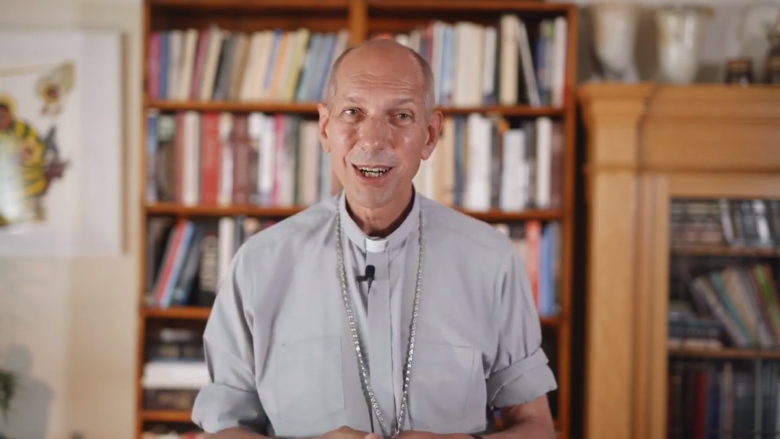
Watch Video Message HERE
June 22, 2021
Warm greetings to the Indigenous Peoples of Treaty 4 territory and to the people of the Archdiocese of Regina.
Watching the news over the past days, attending to the waves of suffering that are being voiced, and listening to questions being asked of the Catholic Church here in Saskatchewan, I am looking for a helpful way to speak into the current situation.
As we marked National Indigenous Peoples Day yesterday, it was so good to see tipis up again on the legislature grounds in Regina. But the identification of 215 unmarked graves on the residential school grounds in Kamloops, and the prospect of more such findings across the country, have brought renewed suffering, new cries for justice, a renewed desire for church and government to come to terms with the past, and understand that this legacy of the past continues and is perpetuated in our society today. There is tension in the air: social upheaval, much trauma; a call to move statues; to boycott churches; churches burning. At the same time, Indigenous voices are being heard in a new way, essential conversations are happening.
Nine years ago I had the privilege of participating in the national Truth and Reconciliation event in Saskatoon. This was life-changing for me. Hearing the profound suffering and many kinds of abuse experienced by so many survivors brought a deep recognition that the Church had been complicit in a system which caused deep wounds, wounds which in many cases have passed from generation to generation. Racism remains deeply embedded in our society. The TRC’s Final Report with its Calls to Action, published 6 years ago, provides an action plan for working with Indigenous Peoples towards a better future. I was grateful that the TRC’s Final Report didn’t dismiss the churches and religious communities that operated residential schools, but rather, called us to repentance and to active engagement. The Calls to Action present to us Indigenous-led ways of seeking to name the truth of colonization, of residential schools, and to point us towards right relationships.
While I was bishop of Saskatoon, we launched a Diocesan Committee for Truth and Reconciliation, made up of Indigenous and Non-Indigenous members. We worked at strengthening relations, and took up the Calls to Action addressed to churches. We tried many things. Some worked and some did not. The two “Moving Forward Together” collections taken in parishes in response to the IRS settlement, did not go particularly well. But the Committee for Truth and Reconciliation proved an effective way to listen to many different Indigenous voices, and to learn to walk together. I learnt the helpful saying ‘nothing about us without us.’ There was also work at a local level to try to invite Pope Francis to Saskatchewan to address Call to Action 58, but we came to learn that this was not the level to take up that kind of initiative.
In Regina, a group of Indigenous and Non-Indigenous people have been working together for several years already on the path to relationship-building and reconciliation. Four years ago, we established an Archdiocesan Commission for Truth and Reconciliation here, which sought to engage with the Calls to Action in 4 areas: in schools, in parishes, in formation, and in the pursuit of justice for Indigenous people. Work continued on a national level, as bishops have engaged with leaders of national Indigenous organizations in preparing for a delegation to go to Rome to meet with Pope Francis. The delegation would include Indigenous leaders, survivors, Elders/Knowledge Keepers and youth, along with a small group of bishops. We want to create a context where Pope Francis can hear directly from First Nations, Inuit and Metis people, and to respond. Are we doing enough? There is no doubt we are being called to do better. There is such a long way to go. I remain committed to work towards truth and right relationships, and to engage with the Calls to Action.
In the midst of the tensions and turmoil of the present moment, a moment which also carries potential for change, I would like to offer a brief word to the Indigenous people of Treaty 4: we as church are ready to meet with you, to meet with survivors and intergenerational survivors, with chiefs, with Indigenous organizations. We are ready to open a conversation about a regional fundraising initiative that could be of help to you. We are ready to accompany you, as far as that is desired, in the four First Nations where there were Oblate operated residential schools, as you do ground penetrating radar searches of grave sites and as you sit with what you find there. We do not want to suppress or hide from the suffering of the past, nor to overlook or dismiss the many ways that Indigenous people in the present continue to carry the heavy burdens of the legacy of residential schools. If you have other requests, we are open to engaging with them. We desire to turn our apologies into concrete plans of action oriented to justice, healing and reconciliation.
If you want nothing to do with the church, I understand. But to the extent that you want to continue to look to the Calls to Action, that you wish to engage with the church, to rebuild relations, to challenge us, to engage in open and even blunt conversations, to look for allies in addressing issues of justice, to engage in discussions about Indigenous spirituality, to work towards right relations and a just society, we will do everything we can so that you will find a willing partner on all of those fronts.
May the Creator guide us to the truth, to right relationships, to a future where peace and justice flourish and we can live side by side in joy.
